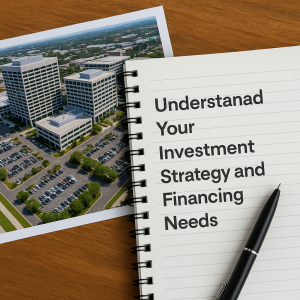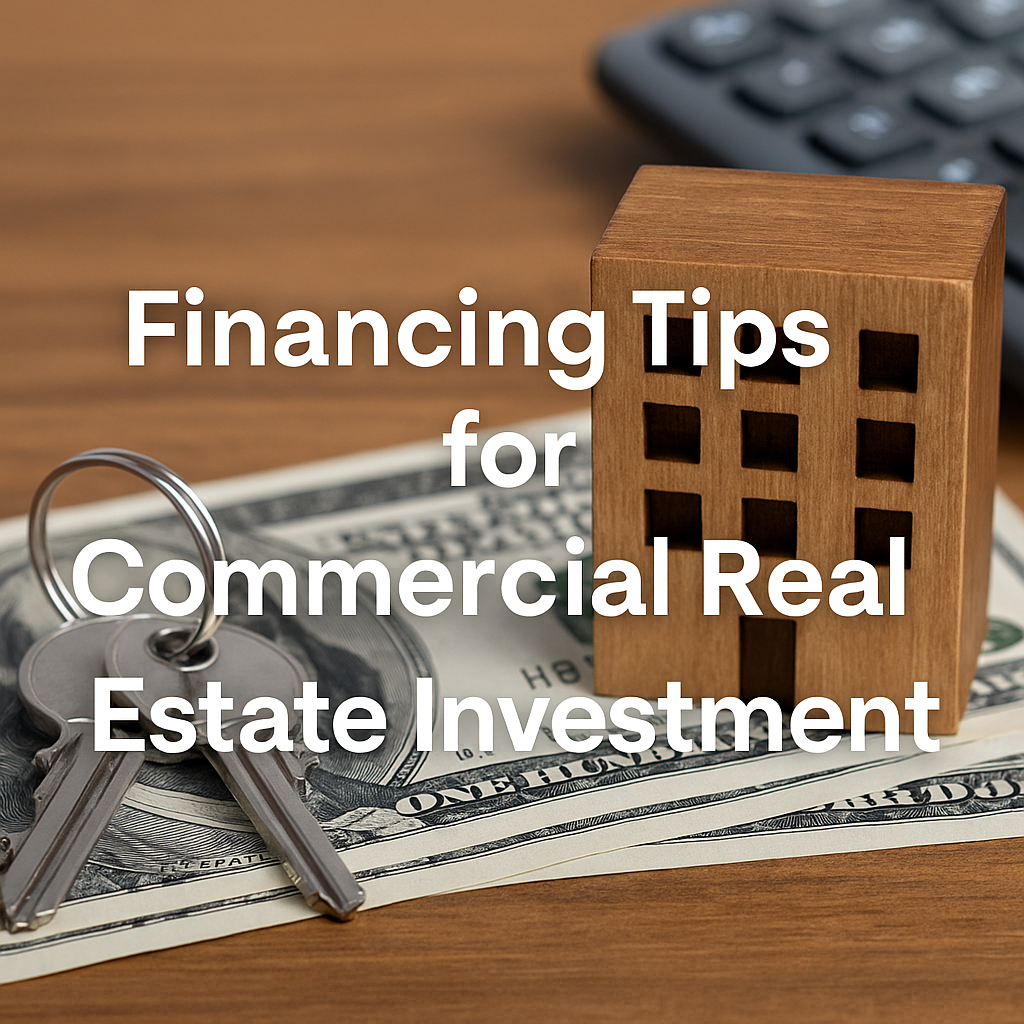Investing in commercial real estate (CRE) in Central and South Florida offers tremendous potential for returns, whether you’re eyeing office spaces in downtown Miami, industrial facilities in Lakeland, or retail properties in Orlando’s thriving tourist zones. However, one of the most critical components of a successful CRE investment is securing financing—and navigating the process can often be complex.
The real estate markets in Central and South Florida are competitive, and gaining access to the right financing can make or break a deal. Understanding your financing options, working with the right financial institutions, and preparing adequately are key to making your investment a reality. This article will outline practical financing tips for commercial real estate investors and explain how Steinbauer Associates can leverage their vast network of financial institutions to help you secure loans with favorable terms.
Understanding Commercial Real Estate Financing
Unlike residential real estate, commercial real estate financing typically involves larger loan amounts, complex underwriting processes, and specific property performance metrics. Lenders will assess not only your personal financial situation but also the income potential and stability of the property you’re investing in. The main types of CRE loans include:
- Traditional Bank Loans
- SBA 504 Loans (for owner-occupied properties)
- Bridge Loans
- Commercial Mortgage-Backed Securities (CMBS) Loans
- Private Lending
- Hard Money Loans
Each financing option comes with different terms, interest rates, and repayment schedules. The right loan for your investment will depend on factors such as the type of property, the duration of your investment, and your financial goals.
Key Financing Tips for Commercial Real Estate in Florida
1. Understand Your Investment Strategy and Financing Needs

Before approaching lenders, it’s crucial to have a clear investment strategy and a detailed understanding of your financing needs. Ask yourself:
- What is the size and type of the property you’re purchasing?
- How long do you plan to hold the property?
- Is the property cash-flowing (producing rental income) or does it need renovations to become profitable?
Different strategies may require different types of financing. For instance, a stabilized property with steady cash flow may qualify for a traditional loan, while a value-add investment (where the property needs renovations or repositioning) may be better suited for a short-term bridge loan or a construction loan.
2. Prepare Strong Financial Documentation

Lenders want assurance that both the investor and the property can meet financial obligations. Being well-prepared with thorough documentation is essential when securing a commercial real estate loan. Documents that may be required include:
- Personal and Business Financial Statements: Lenders will want to see your personal financial health, especially if you’re offering a personal guarantee. This includes tax returns, bank statements, and proof of assets.
- Credit Reports: Both your personal and business credit scores will factor into the lender’s decision.
- Business Plan and Cash Flow Projections: Lenders often request a business plan that outlines how you plan to operate the property and generate revenue. Detailed cash flow projections are critical for showing the lender how you’ll meet your debt obligations.
- Property Financials: If you’re purchasing an existing property, have financial records such as income statements, rent rolls, and historical performance ready. This will help the lender evaluate the property’s current and future earning potential.
3. Consider Your Loan-to-Value (LTV) Ratio
The Loan-to-Value (LTV) ratio is a key metric that lenders use to determine how much financing they are willing to provide. In general, CRE lenders are more conservative than residential lenders. A typical LTV ratio for commercial real estate loans ranges from 65% to 80%, meaning you’ll need to provide a down payment of 20% to 35% of the property’s purchase price.
For example, if you’re purchasing an office building in downtown Miami valued at $5 million, you may need to bring between $1 million and $1.75 million to the table. Having the capital ready for the down payment can increase your chances of securing a loan, as it shows the lender that you are financially committed to the project.
4. Negotiate Favorable Loan Terms
While securing financing is important, it’s equally critical to negotiate favorable loan terms. Look for the following when negotiating:
- Interest Rates: Commercial real estate loans typically come with higher interest rates than residential loans, often ranging between 3.5% and 6.5% depending on the lender and loan type. Aim to lock in the lowest rate possible.
- Amortization Periods: Loan repayment periods for CRE typically range from 5 to 20 years. The amortization period will affect your monthly payments, so consider how it aligns with your property’s cash flow.
- Prepayment Penalties: Some commercial loans come with prepayment penalties if you pay off the loan early. Make sure to discuss these terms upfront, especially if you plan to sell or refinance the property in the near future.
- Personal Guarantees: Some loans may require a personal guarantee, meaning you’re personally responsible if the property fails to generate enough income. Negotiate the extent of your liability.
Working with a real estate expert who understands CRE financing can help you secure more favorable terms and avoid costly mistakes.
5. Leverage Steinbauer Associates’ Network of Financial Institutions

One of the biggest challenges investors face in CRE financing is finding the right lender. Steinbauer Associates, a leading commercial real estate firm with decades of experience in Central and South Florida, can be a key asset in this regard. Their extensive network of local and national financial institutions allows investors to tap into competitive financing options and streamline the loan approval process.
Here’s how Steinbauer Associates can help you secure financing for your next CRE investment:
Extensive Relationships with Top Lenders
Steinbauer Associates has long-standing relationships with a wide variety of lenders, including traditional banks, credit unions, private lenders, and commercial mortgage brokers. Their network includes institutions that specialize in CRE financing, giving investors access to lenders who understand the local market and are more likely to offer tailored loan products that fit the unique needs of Florida investors.
Access to Off-Market and Private Lending Opportunities
In a competitive market like Florida, traditional loans may not always be the best or most accessible option, especially for time-sensitive deals. Steinbauer can connect investors with off-market lenders and private funding sources for specialized financing solutions such as bridge loans and hard money loans. These options can provide faster funding for value-add properties, renovation projects, or acquisition opportunities where speed is essential.
Expertise in Loan Negotiation
Steinbauer’s team of CRE experts not only helps you find financing but also acts as an advocate during the negotiation process. By leveraging their knowledge of loan structures, interest rates, and market dynamics, Steinbauer Associates works to secure the most favorable terms for your loan, potentially saving you thousands over the life of the loan.
Tailored Financing Strategies
Not all loans are created equal. What works for one investor might not work for another. Steinbauer Associates takes the time to understand your unique investment goals, risk tolerance, and financial situation. Based on this, they create a tailored financing strategy that aligns with your property’s type, expected cash flow, and your long-term objectives.
6. Explore Local and Federal Financing Programs
Investors in Central and South Florida can also take advantage of government-backed financing programs, particularly if you’re investing in Opportunity Zones or developing properties that contribute to economic revitalization.
SBA 504 Loans
The Small Business Administration (SBA) 504 loan program offers long-term, fixed-rate financing for the purchase of commercial real estate or major renovations. These loans are particularly attractive to investors looking to occupy their properties or finance owner-occupied buildings.
Opportunity Zones
Opportunity Zones in Florida offer tax incentives for investors who reinvest capital gains into properties located in designated low-income or economically distressed areas. These incentives can include capital gains tax deferrals, step-ups in basis, and even tax-free gains if the investment is held for a certain period. Steinbauer Associates can guide investors through identifying properties in Opportunity Zones and connecting them with lenders experienced in financing these types of projects.
Conclusion
Securing financing for commercial real estate in Central and South Florida requires careful planning, market knowledge, and access to the right financial resources. By understanding your investment goals, preparing strong financial documentation, and negotiating favorable loan terms, you can increase your chances of obtaining the best possible financing for your CRE investments.
Working with Steinbauer Associates offers a distinct advantage, thanks to their deep connections with financial institutions and expertise in structuring financing solutions that align with the unique demands of the Florida CRE market. Whether you’re looking to acquire a retail center in Orlando, an office building in Miami, or an industrial facility in Tampa, Steinbauer Associates is your trusted partner in securing the capital you need to make your investment a success.
Ready to finance your next CRE venture? Contact Steinbauer Associates today to leverage their network and expertise for your Florida real estate investments.




